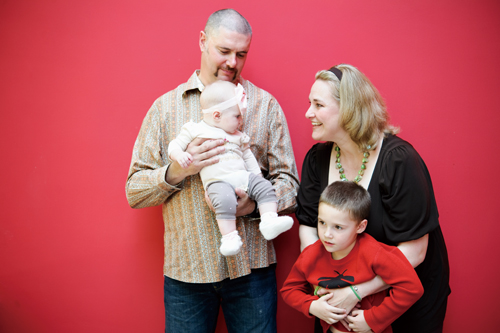
Kelly Crysell has lived in Beijing for over a decade, but still finds herself wide-eyed at the more intangible side of this sprawling city. “Even mundane tasks like getting a bike tire fixed are infinitely more interesting in China,” she says. “Going to the men on the street in a nearby hutong is such a different experience from going to a big superstore in your home country.” Crysell, a third grade teacher at the Western Academy Beijing (WAB), says that Beijing’s everyday quirks have deepened her love for her adopted home rather than detract from it.
While she finds adventure in the day-to-day details of life in Beijing, she also values the consistency of her routine. The latter stems largely from working at an international school – one of the many opportunities that Beijing has offered her. One of the biggest perks of working at WAB is the day nursery provided for staff. “I love it because [my daughter]has lots of friends to play with” says Crysell. “It was easy to come back to work when my maternity leave was over because I knew my baby [would be]nearby.”
The Crysells are just one of many foreign families forming part of a distinctive group in Beijing. You could call them long-term laowai – former outsiders who have settled down and found their niche in a city that typically draws newbies in droves, only to see them leave after a few months or years. However, Crysell hasn’t always felt at home here. In fact, her relationship with Beijing wasn’t so much love at first sight as an acquired taste.
Before teaching at WAB, she worked at a school in Malaysia. She had trouble switching from the latter’s balmy tropical weather to Beijing’s drafty, smoggy winters. But that wasn’t the only hurdle she faced before settling down in the capital. “Riding a bicycle in sandstorms in the spring and navigating everyday life in a language that I seemed destined to not understand – I wasn’t a fan,” Crysell says of her early days here.
Kristen Billings, one of Crysell’s fellow teachers at WAB, couldn’t agree more. Her feelings about Beijing have remained conflicted since she arrived here 13 years ago. She is a mother of two: Henry (age 5) and Esme, who turned 1 in May. Both of Billings’ children were born at Beijing United Hospital.
“I’ve always had a love-hate relationship with Beijing,” she says. Her disdain stems from the city’s pollution, traffic, and rude drivers. Like Crysell, however, Billings cites her job as a major factor for staying, and adds that Beijing’s museums, restaurants and activities are also major incentives. But most of her reasons for settling here are more universal, and larger than the city’s specific oddities.
“I met my husband [here]. We got married, bought a car, got two dogs, and had our kids here,” she says. “We made a life here, and now this is where we live. I never came to Beijing thinking I would stay forever. However, I have never not thought about staying forever; we’ve just sort of landed here. That could change, [but]we don’t have any big plans to move anywhere else.”

What’s more, Billings cites her family’s ayi, Zhang, as a perk of living here. “Not only is she a tremendous help to us, working and raising two children,” she says, “but she [has become]a family member.” In many ways, Zhang has become a third parent to Billings’
children: “They adore her and she adores them.”
The thought of leaving and breaking that tie is tough to even contemplate. “Our daughter Esme is small enough that she would likely not suffer too much,” says Billings. “But Henry would grieve for a very long time over leaving Zhang – she has been with us since he was nine days old.”
Asides from the city’s kid-friendliness, other parents say Beijing can be equally accommodating for grownups. “Having lived in other places in China, I only ever want to live in Beijing,” says Jorn Knutsen, a managing partner at an IT outsourcing firm who has lived in China for 13 years. Two of those years were spent in Suzhou, and two more in Dongguan. During that time, he married born-and-raised Beijinger Yanqing Ma. They are now parents to Bjorn Alexander, their 4-year-old son.
“People here are more cultured [than in Suzhou or Dongguan]and understand that there is a time for work and a time to socialize, that the two need not be mixed,” says Knutsen. “I have a good balance between work and family time, and I doubt I could have that in many other parts of the world.”
But over the years, Beijing’s flaws have started to wear Knutsen down. “There are no benefits for my child here,” he says. “There is better schooling elsewhere, as well as better social activities and community programs in most other places in the world.” He also cites the worsening pollution and soaring cost of living as drawbacks. “It is becoming increasingly difficult to find the right talent to do a lot of the work we need doing,” he adds. As a result, his company is looking to move overseas.
His wife, Yanqing, is slightly less pessimistic. “This is my hometown, where I grew up,” she says. “[However,] the pollution, traffic, food safety issues, and education for my son – these factors make me want to leave. I would miss everything that is nice in Beijing, but definitely not the bad air.”
Crysell’s feelings about Beijing, on the other hand, have taken the opposite trajectory. She was culture shocked at first, feeling overwhelmed and unimpressed. But after a year or two, Beijing started to grow on her. She acknowledges that the city’s rising cost of living and pollution levels are off-putting, but Crysell feels that Beijing has grown more accommodating of expats by the year – especially since 2008.
“The Olympics were a real game changer,” she says. “The infrastructure of the city improved quickly and Beijing became more of a ‘community.’ It was fun to watch all the [sporting]events, with everyone screaming out ‘Jiayou!’ I felt really proud of Beijing during that time.”
Ironically, the post-Olympic sanitization of several downtown areas helped Crysell appreciate the city’s grittier side. “I love the juxtaposition of old and new in Beijing” she says. “You see it when you pull up to a stoplight and there is a Porsche on your left and a vegetable seller in a horse cart on your right.” It’s the same feeling she gets when she sees a siheyuan [traditional hutong courtyard home]among a block of skyscrapers, “when the old is hidden within the new or the other way around.”
Billings says that having her children grow up here helps her whole family appreciate one of Beijing’s most crucial cultural aspects: Mandarin. “My kids have an extended Chinese family and can communicate on a near-native level in a language that I still don’t speak very well after 13 years,” she says. “They have homegrown Chinese, and that is amazing to both my husband and I.”
Like Knutsen, Billings appreciates the advantages that her job and the local lifestyle provide. She can enjoy her children’s fluency in Chinese all the more when she arrives home every day. “We get home at a decent hour to a clean [house], dinner on the table, and happy, fed, stimulated children chattering away in Chinese to their beloved ayi. The dogs are walked and fed and every one is able to focus on each other for a few hours before bedtime. Not many working parents have this luxury.”
photos by Judy Zhou
This article originally appeared on p45-48 of the beijingkids July 2013 issue.
Check out the PDF version online at Issuu.com



